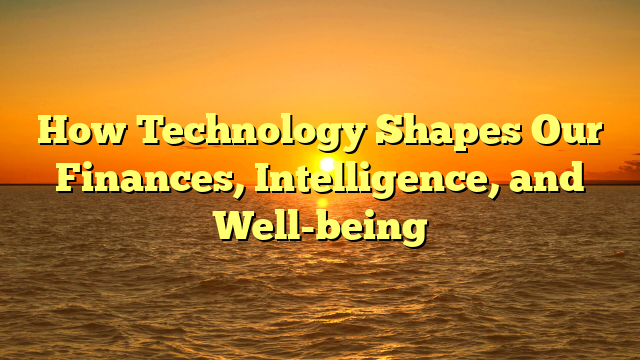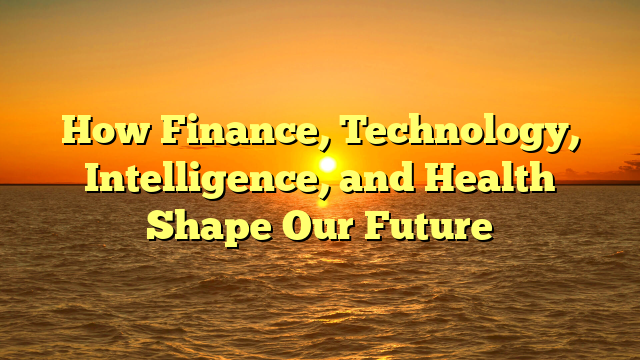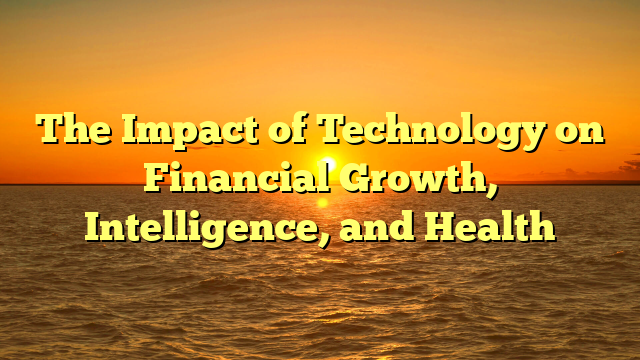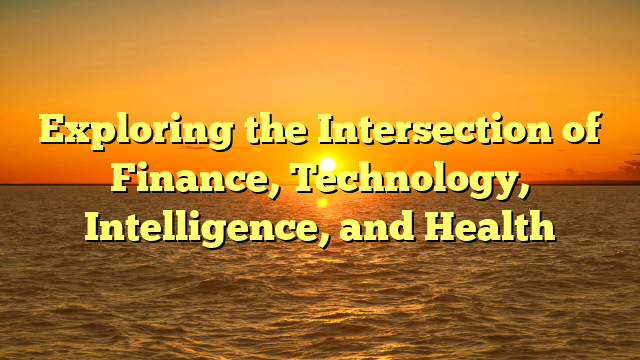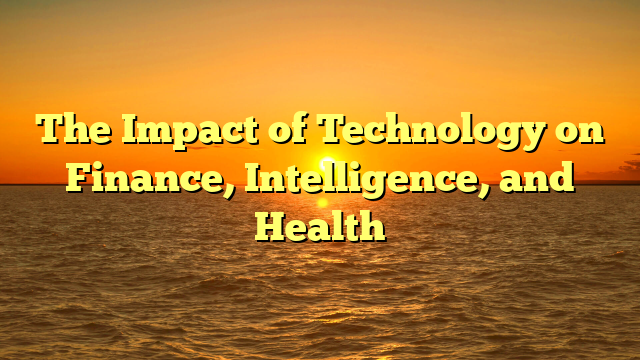
In today’s rapidly evolving world, the intersection of financial markets, artificial intelligence, and healthcare technology is becoming increasingly significant. As technological progress continue to shape various industries, their influence on these sectors grows stronger. This article explores the relationship of technology on finance, intelligence, and health, demonstrating how these fields are interlinked and how innovation drives improvements in each area.
The Role of Technology in Finance
Technology has revolutionized the way the financial industry operates. From the development of online banking systems to the emergence of cryptocurrencies and blockchain technology, banks and financial entities have had to adapt quickly to maintain their competitive edge. magnumtogel of the most notable advancements is the rise of FinTech, which integrates technology into financial services to streamline processes and improve user experience.
Blockchain is one of the most transformative technologies in finance. It enables secure transactions without the need for intermediaries, reducing the risk of fraud and increasing transparency. Moreover, blockchain allows for peer-to-peer transactions, which can reduce transaction costs and provide access to financial services for those who have been excluded from traditional banking systems.
The rise of cryptocurrencies such as Bitcoin and Ethereum has further challenged traditional finance, creating a new asset class and investment opportunities. Investors now have access to a decentralized market that is not controlled by governments or financial institutions. As cryptocurrencies gain mainstream adoption, their potential to disrupt global financial systems becomes more apparent.
In addition to cryptocurrencies, technology has enabled the rise of algorithmic trading, where algorithms analyze vast amounts of data and execute trades at speeds far faster than human traders. This type of trading has created new opportunities for investors but has also raised concerns about market volatility and the role of AI in decision-making.
Artificial Intelligence and Its Influence on Intelligence
Artificial intelligence (AI) is another area where technology is having a profound impact. AI is defined as the simulation of human intelligence processes by machines, particularly computer systems. These processes include learning, reasoning, and self-correction, and they are transforming how we approach complex tasks.
In the realm of finance, AI is being used to analyze vast datasets, identify patterns, and make predictions about market trends. Machine learning algorithms can process massive amounts of data much faster than human analysts, providing valuable insights for decision-makers. AI-driven systems can also help detect fraudulent activity by recognizing unusual patterns and behaviors within transaction data.
AI is also playing a crucial role in the development of intelligent systems that enhance human cognitive abilities. For example, AI-powered personal assistants, such as Siri and Alexa, have become ubiquitous in households worldwide. These systems can process voice commands and provide information or perform tasks, making daily life more efficient.
Moreover, AI is revolutionizing industries such as healthcare, where it is used to analyze medical data and assist in diagnosing diseases. In the future, AI may be able to collaborate with medical professionals to develop personalized treatment plans based on an individual’s genetic makeup, lifestyle, and environmental factors. This advancement could lead to a more precise and effective healthcare system.
Health Technology and Its Revolutionary Impact
In the field of health, technology has had a profound impact on both the way healthcare services are delivered and how individuals manage their well-being. From electronic health records (EHR) to wearable devices that monitor vital signs, technology is enhancing patient care and promoting healthier lifestyles.
One of the key advancements in healthcare technology is the development of telemedicine. Telemedicine enables patients to consult with healthcare providers remotely, eliminating the need for in-person visits. This is particularly beneficial in rural areas or for individuals with mobility challenges. Moreover, telemedicine has gained significant traction during the COVID-19 pandemic, where social distancing measures made in-person consultations difficult.
Wearable devices such as smartwatches and fitness trackers have also revolutionized the way individuals track their health. These devices can monitor a range of metrics, including heart rate, blood pressure, sleep patterns, and physical activity. The data collected can be analyzed to provide personalized recommendations for improving health, thereby empowering individuals to take a more active role in managing their well-being.
Another exciting development in health technology is the use of AI in diagnosing diseases. AI-powered diagnostic tools can analyze medical imaging, such as X-rays and MRIs, to detect abnormalities that may be missed by the human eye. These systems can also assist in identifying diseases at an earlier stage, leading to better outcomes and more effective treatments.
In addition, advancements in genomics and personalized medicine are enabling healthcare providers to tailor treatments to an individual’s genetic profile. This approach, known as precision medicine, allows doctors to select the most effective treatments based on a patient’s unique genetic makeup, reducing the trial-and-error approach to healthcare.
What Lies Ahead for Technology in Finance, AI, and Healthcare?
As we look to the future, it is clear that technology will continue to transform finance, intelligence, and healthcare in profound ways. The integration of AI, blockchain, and wearable technology into these sectors is just the beginning. The next few decades will likely bring even more revolutionary changes as we unlock new ways to use technology to improve lives.
In finance, we may see the rise of CBDCs, which are digital versions of national currencies. These digital currencies could offer many benefits, including faster and cheaper cross-border transactions, enhanced security, and greater financial inclusion. Governments and central banks around the world are already exploring the potential of CBDCs, and their widespread adoption could reshape the global financial landscape.
In the realm of AI and intelligence, the development of artificial general intelligence (AGI) is a key area of focus. AGI refers to machines that possess the ability to understand and reason about the world in a way that is comparable to human intelligence. While AGI is still in the early stages of development, it holds the potential to solve complex problems across a wide range of fields, from healthcare to environmental sustainability.
In healthcare, advancements in bioengineering and nanotechnology may enable the development of new treatments and therapies that were once thought impossible. For example, researchers are exploring the potential of nanobots that can be injected into the human body to perform tasks such as delivering drugs directly to cancer cells or repairing damaged tissues at the cellular level.
As these technologies continue to evolve, it is essential for society to consider their ethical implications. Questions surrounding privacy, data security, and the potential for job displacement due to automation need to be addressed to ensure that these advancements benefit everyone.
Conclusion
In conclusion, the integration of technology into finance, intelligence, and healthcare has already had a profound impact on these sectors. As advancements continue, we can expect further disruption and innovation, which will create new opportunities and challenges. The future of technology promises a more interconnected, efficient, and personalized world, where individuals can make smarter financial decisions, enhance their cognitive abilities, and receive better healthcare. The key to success lies in harnessing the potential of these technologies while addressing their ethical and societal challenges.


